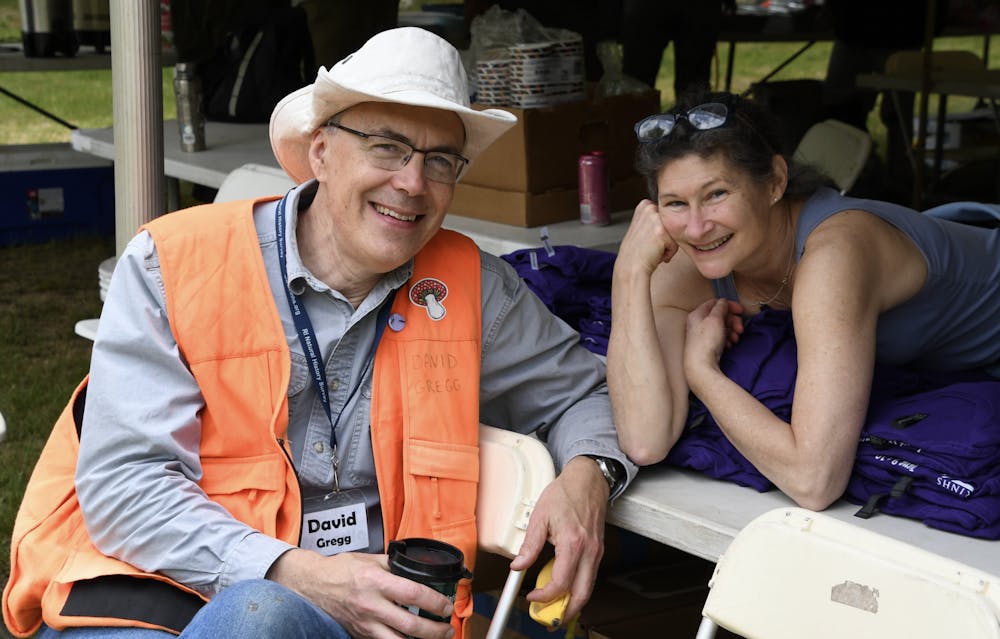Back in 2000, when then Brown PhD candidate David Gregg PhD’00 was reading the Providence Journal over his fiancée’s shoulder, a small invitation caught his eye: The Rhode Island Natural History Survey wanted volunteers to join their first ever BioBlitz, a whole day of counting animal and plant species at Roger Williams Park.
Gregg, a former “insect kid” and continuing enthusiast of the natural world, decided to join in a heartbeat.
“I stayed overnight and counted moths and beetles,” Gregg recalled. “I joined right then and there as a member.” Now, as executive director of the NHS, Gregg is getting ready for his 25th BioBlitz with the organization.
A BioBlitz is a volunteer-based effort to count as many species of plants and animals as possible on a specific piece of land within the span of 24 hours.
According to Gregg, such events gained popularity in the early 2000s. “And this teeny, tiny nonprofit in Rhode Island recognized that (the BioBlitz) embodied a lot of the same ideas that (it was) formed around,” he said.
While Gregg recognizes that BioBlitzes are limited in the amount of scientific information they can collect, they serve as community-building, educational tools. Bioblitzes, he said, “are a really good idea in terms of just putting people together so that they can communicate.”
When selecting the location of a BioBlitz, the NHS considers two main criteria: The land should be under some type of conservation and its host should be “energetic.”
According to Gregg, the BioBlitz directly benefits conservation efforts. Having so many people present to enjoy preserved land “elevates that whole (conservation) project for the whole community,” he said.
The concept of participating in BioBlitzes as teams was proposed in 2008 when Gregg pitched the BioBlitz for coverage by the WBRU sports radio program. But when the show’s producer decided to record the event, Gregg said he quickly had to come up with a way to “make it sound like a game.”
Suddenly, Gregg said, the BioBlitz gained a new structure: “Can you beat last year’s butterfly record, and can the moth team beat the beetle team?” According to NHS Program Administrator Kira Stillwell, this addition proved auspicious, as it required more engagement and coordination between participants and led to more robust inventories.
Now, the teams go beyond taxonomic categories and include groups dedicated to art, creative writing and journaling. There are “so many ways that we learn important information about where we are besides a list of species,” Gregg said.
In 2008, the NHS also secured a sponsorship from the Roger Williams Park Zoo, granting the organization increased funds and, as a result, the flexibility to explore new locations.
“The first BioBlitzes were organized in places where there were nature centers and built infrastructure for us to use,” Gregg said. The funding enabled them to “rent a tent, tables, chairs, a generator (and) porta potties” and host BioBlitzes in locations “that had almost no support.”
The zoo continues to serve as the major sponsor for the NHS’s BioBlitz. The event’s mission to connect people with wildlife and promote community engagement with science aligns closely with the goals of the zoo, according to Lou Perrotti, the zoo’s director of conservation programs.
According to Gregg, the NHS’s event is the “longest-running annual BioBlitz in the world.” And while it has gained more funding and structure, Stillwell said that “the most remarkable part about it is what hasn’t changed.”
While the COVID-19 pandemic forced the NHS to make adjustments, the Survey’s BioBlitz persevered.
In 2020, the event was to be located at the Mercy Woods Preserve in Cumberland, but it was postponed until fall 2021. “The pandemic was a downer that required us planners to rethink … refocus and reorganize the event to pull it off, but we did,” Dave Newton, director of the Cumberland Land Trust, wrote in an email to The Herald.
According to Newton, “approximately 120 scientists, naturalists and volunteers” joined the event and identified nearly 800 species at Mercy Woods, which offers a “variety of habitats to inspect,” including pine forests, meadows and small wetland areas.
“I still get goosebumps when I think of (that) great time and experience,” he wrote.
BioBlitz’s 25th-anniversary event will return to a familiar site: the Norman Bird Sanctuary in Middletown, which hosted the second-ever Rhode Island BioBlitz. The sanctuary will also be celebrating its 75th anniversary.
“The sanctuary has protected native wildlife, provided environmental education programming on campus and in classrooms across Rhode Island, hosted iconic events … and offered sanctuary and community to thousands of nature-lovers from around the world” since 1949, wrote Anna Turner, research and collections coordinator at the sanctuary, in an email to The Herald.
“What is especially exciting about the BioBlitz being held at (the sanctuary) is our many diverse habitats that are ripe for exploration — we have salt marshes, ponds, forests, meadows, dunes, ridges, fields, gardens and orchards,” Jolie Colby, the sanctuary’s director of education, wrote in an email to The Herald.
Before the quarter-centennial celebration, which will take place on June 7 and 8, the sanctuary plans to host a “Spotlight on BioBlitz” event on Nov. 15 introducing attendees to the program.
Beyond providing an updated “biodiversity inventory that will inform land stewardship at (the sanctuary),” the 25th-anniversary celebration will introduce the sanctuary “to a wider community of naturalists,” create “opportunities for inter-generational engagement” and provide meaningful encounters with nature — “an opportunity that’s increasingly rare these days,” Colby wrote.
Gregg hopes to see more resources made available for the conservation of native Rhode Island wildlife. For him, efforts such as BioBlitz are crucial to building communities that care for the environment.
“We have this really well-educated population,” he said. “So if we could only leverage what they know, then that would help to fill the gap that the state resources don’t fill.”

Julia Vaz was the managing editor of newsroom and vice president on The Herald's 134th Editorial Board. Previously, she covered environment and crime & justice as a Metro editor. A concentrator in political science and modern culture and media, she loves watching Twilight (as a comedy) and casually dropping the fact she is from Brazil.





